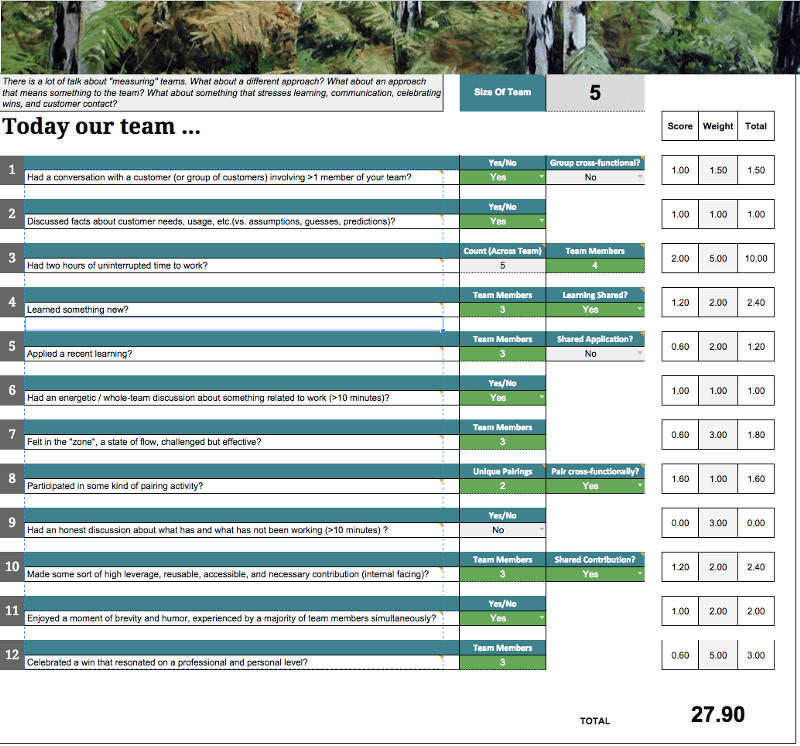Team health is measurable
I hear people talking all the time about “measuring” product development teams. Do we measure velocity, value delivered, or bugs removed/introduced? But what if you flipped the script? What if teams devised their own daily check-in to gauge their performance or team health score? What if they focused on great leading indicators of success and health, and used those measures to guide continuous improvement efforts?
I think you’d see something very different emerge. As individuals, we care for our health. As teams, we should do the same, (and it doesn’t require a Fitbit).
Here’s a simple model for a daily check-in. I created a spreadsheet version in Google Sheets.
I’ve included the questions below with some background. The spreadsheet has a simple weighted scoring system.
Today, our team:
Had two hours of uninterrupted time to work? How can any team function if their time is being continuously interrupted? Before you know it the whole day has slipped away. Two hours is an ideal chunk of time. Hammering out two chunks of two hours each is a major accomplishment in a distraction-filled environment.
Had a conversation with a customer (or group of customers) involving >1 member of your team? Why silo the front-line from customers? It may seem more efficient to let people act as an interface. But in my experience, that just encourages hoarding of data and introduces signal loss as information is filtered through to the builders and makers. Regular contact with customers improves intuition and encourages empathy.
Discussed facts about customer needs, usage, etc. (vs. assumptions, guesses, predictions)? Are your meetings filled with guesses? Guesses are cheap. Shift the conversation to facts and data. You’ll find that meetings suddenly become a lot more productive (and even fun).
Learned something new? If the team is not learning—about customers, the domain, their technology, or themselves—then they’re slipping backwards. Learning new things is stimulating. It makes your current job worth it, and sends you packing if it isn’t happening.
Applied a recent learning? To hone a skill you must apply it. Did you apply a recent learning today? Not something you learned in high school—that’s cool too—but something you learned in the last couple weeks.
Had an energetic/whole-team discussion about something related to work (>10 minutes)? We’ve all experienced those spontaneous conversations with our team. They aren’t forced. They need no official meeting to emerge. Everyone just spins around in their chair and starts having a good face-to-face conversation.
Celebrated a win that resonated on a professional and personal level? Most milestones don’t really resonate. A sense of impact is largely personal. How many team members experienced a win today?
Felt in the “zone”, a state of flow, challenged but effective? Flow is a great feeling. Time flies. The work is challenging but achievable. You don’t feel like you’re trashing. Anti-flow comes in many forms—negative dynamics, interruptions, lack of mission, and poor tooling. How many members of your team were in the “zone” today? In my experience this is contagious. When it’s “game on” everyone benefits.
Participated in some kind of pairing activity? Structured pairing can feel oppressive (especially if forced). But working alongside someone for some period of time can be a positive experience. Doing this cross-functionally (UX and engineering, for example) can yield awesome results.
Had an honest discussion about what has and what has not been working (>10 minutes)? Can the team “be real”. Did they get real? If so, this is a good sign. It is almost impossible to continuously improve if there is not a level of openness, trust, and safety.
Made some sort of high leverage, reusable, accessible, and necessary contribution (internal facing)? Not all work is customer facing. Sometimes we take the bull by the horns and improve an internal tool, or process. The work has a large benefit for the rest of the team.
Enjoyed a moment of brevity and humor that is experienced by a majority of team members simultaneously? Have fun! The other day a joke on our team started on Slack and ended in a full team laugh. That’s powerful. If you can’t have fun together, it is unlikely you’ll be able to weather the dips of product development.
This post was originally published by Pendo’s Senior Product Manager, John Cutler, on Medium. Subscribe to the Pendo blog to receive product manager insights and product success stories every week.





